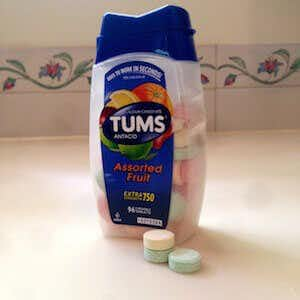
It may be hard to imagine that over-the-counter products like antacids or even vitamin or mineral supplements might cause trouble. It makes sense, though, to read and follow the directions on the labels if you aren’t explicitly under medical care. Even seemingly innocuous products can become dangerous if used for too long or at too high a dose.
Can You Safely Take Tums for a Long Time?
Q. I just heard about bismuth toxicity from habitually taking Pepto-Bismol for a long time. Are you aware of anything similar for people who take more than the recommended dose of Tums long term?
A. Taking more than the recommended dose of calcium carbonate (Tums or any dietary supplement) can result in something called the milk-alkali syndrome. In this metabolic imbalance, people develop high levels of calcium in the blood and possible kidney injury along with alkaline blood. They may experience symptoms of calcium overload such as headache, dizziness, nausea or loss of appetite (StatPearls, Feb. 19, 2023).
Many people take calcium carbonate as a calcium supplement to try to prevent osteoporosis.
A review of the literature concluded, however,
“The evidence suggests that calcium, vitamin D, or calcium plus vitamin D supplementation has no effect on bone mineral density at any site (hip or spine) in healthy premenopausal women.” (Cochrane Database of Systematic Reviews, Jan. 27, 2023).
A separate analysis of medical research suggests that calcium from food has several benefits, but calcium supplements may increase the risk of kidney stones and cardiovascular complications (Clinical Interventions in Aging, Nov. 28, 2019). Data from the Nurses’ Health Study indicate that women who consume at least two servings of dairy products daily have a lower risk of bone fracture (American Journal of Clinical Nutrition, Dec. 2023).
Too Many Tums?
Other readers have expressed similar concerns. Here is an earlier question.
Q. My wife has been taking three Tums tablets (750 mg) daily for years as a source of calcium. Is this amount safe? She has lost her appetite.
A. Your wife is getting 2250 mg of calcium carbonate daily, 40 percent of which is elemental calcium. That means she is taking in 900 mg of the mineral in addition to any calcium in her diet. That might be too much.
Taking in excess calcium and antacid (such as in calcium carbonate) for months or years can result in “milk-alkali syndrome.” This condition may lead to symptoms such as loss of appetite and stomach pain and raise the risk of kidney stones or even kidney damage.
Perhaps your wife’s doctor could refer her to a registered dietitian or other nutrition expert who could help her review her diet to see whether she is in fact getting too much calcium and alkaline compounds. She might be able to shift to a dfferent dietary pattern that would not put her in danger, while still providing the minerals she needs. Calcium is not the only nutrient essential for strong bones. Scientists have long known, for example, that vitamin D is essential (American Journal of Clinical Nutrition, Feb. 2003).
For more information, we recommend our one-hour interview with Michael Castleman and Walter Willett, MD, DrPH, “Bone Vitality.”
Our Guide to Osteoporosis also has helpful advice on maintaining strong bones.
Citations
- Ali R et al, "Milk-Alkali Syndrome." StatPearls, Feb. 19, 2023.
- Méndez-Sánchez L et al, "Calcium and vitamin D for increasing bone mineral density in premenopausal women." Cochrane Database of Systematic Reviews, Jan. 27, 2023. doi: 10.1002/14651858.CD012664.pub2
- Li K et al, "The good, the bad, and the ugly of calcium supplementation: a review of calcium intake on human health." Clinical Interventions in Aging, Nov. 28, 2019. DOI: 10.2147/CIA.S157523
- Yuan M et al, "Types of dairy foods and risk of fragility fracture in the prospective Nurses' Health Study cohort." American Journal of Clinical Nutrition, Dec. 2023. DOI: 10.1016/j.ajcnut.2023.09.015
- Feskanich D et al, "Calcium, vitamin D, milk consumption, and hip fractures: a prospective study among postmenopausal women." American Journal of Clinical Nutrition, Feb. 2003. DOI: 10.1093/ajcn/77.2.504

